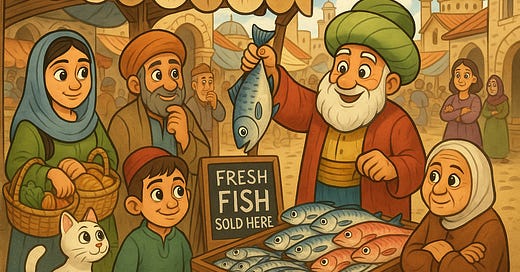Nasreddin Hodja is the famous “holy fool” of Turkish folktales. A consummate trickster who more often than not finds himself at the joke end of the joke, the character of Nasreddin is likely based on a historical figure who may or may not have lived in 13th-century Anatolia.1
Here’s my own rendition2 of a beloved Molla Nasreddin tale I heard as a child. Kind of like the writing life.
Come one, come all!
Sea bream and sardine, mackerel and mullet, even little anchovies!
Get yours here!
Nasreddin Hodja was proud of his new fish shop. It was only 5 am, but there he was with a big smile, standing outside the shop and inviting customers in. He had even made a signboard. It read:
FRESH FISH SOLD HERE
He was open for business!
Soon enough, a young woman happened along with her father in tow, her kitchen baskets already loaded down with produce and bread. Slyly, she said: Molla efendi! Why do you say FRESH? You’re not planning to sell me stale fish, are you now?
Of course not, hanımefendi, bowed Nasreddin Hodja, kardeşim, he bowed again to her father, and rubbed out the word FRESH. Now the board read:
FISH SOLD HERE
Soon enough, a man of his own age happened along. Holding one hand behind his back, he said officiously: I beg your pardon, Üstad Nasreddin, I do not mean to cause offence. But is the word HERE really necessary? He ran the other hand gravely through his salt-and-pepper beard. The citizens can see that this is where you sell your fish, can they not?
Why, that’s true, kardeşim, said Nasreddin Hodja, and rubbed out the word HERE. Now the board read:
FISH SOLD
Soon enough, a woman happened along who had lines on her forehead. Victor of an untold number of market arguments, she said loudly: O Hodja, who you trying to fool with SOLD? Everyone knows that you’re not here giving good fish away for free. And if you are, she added for good measure, something is fishy.
All’s above board, anneciğim, bowed Nasreddin Hodja, I assure you, and rubbed out the word SOLD. Now the board read:
FISH
Soon enough, a cheeky little boy happened along. Immediately turning out his empty pockets to show that his motives were entirely altruistic, he said: Molla efendi! Why do you say FISH? We can smell it from right over there, you know. What else could you be selling?
Out of the mouths of babes, evladım, said Nasreddin Hodja, and rubbed out the word FISH. Now the board was empty.
And Nasreddin Hodja stood there, scratching his turban.
Soon enough, his wife happened along. O kocam, she said, why do you stand here next to an empty board, your face all long like our fish? You had all morning, eh? Give it here, canım, why don’t we write:
FRESH FISH SOLD HERE
Image: Inaccurate but least horrific illustration I could generate using ChatGPT © Kanya Kanchana
#word #folktale #writing #editing
Nasreddin Hodja’s hold on the Islamic cultural imagination—particularly those of Azerbaijan, Kazakhstan, Kyrgyzstan, Tajikistan, Türkiye, Turkmenistan, and Uzbekistan—is such that there’s an annual International Nasreddin Hodja Festival in Akşehir, Türkiye. What’s more, The Telling Tradition of Nasreddin Hodja Anecdotes is part of the UNESCO Representative List of the Intangible Cultural Heritage of Humanity. And to the delight of kids everywhere, his tales have now spread across continents.
Apologies if I’ve got my forms of address wrong.




